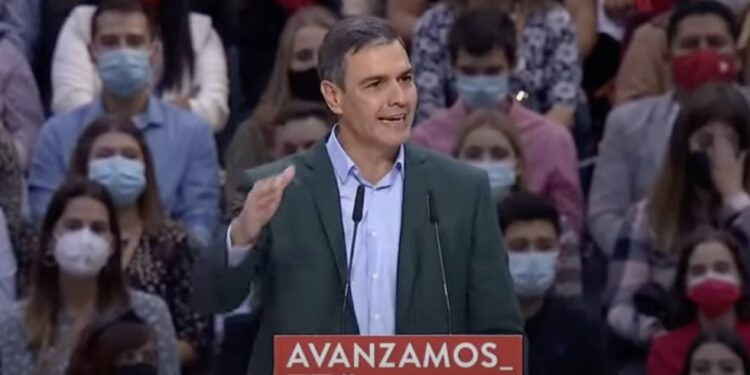Ángel Collado
The main practical consequence for Spanish politics of PSOE’s Federal Congress and PP’s National Convention is the official thawing of relations between the two parties.
If Pablo Casado saved the great assembly of the PP a fortnight ago as a ceremony of internal unity and then dared to challenge Pedro Sánchez to negotiate the renewal of the pending institutional bodies, the President of the Government accepted the challenge as the best possible prologue for his exhibition of personal control of the socialist apparatus staged last weekend.
Sánchez, the Spanish Prime Minister with the fewest votes and seats in Spain’s democratic history, got his photo, including a hug, with Felipe González. The former Prime Minister, the highest representative of the old PSOE, is the first critic of his successor’s methods for coming to power: the alliance with extreme left-wing populists, pro-independence and Batasunos. It is the image that Sánchez had left to certify to public opinion the party’s surrender to him.
The Socialist Party adapts to the interests of its leader with the same logic as the latter assumes those of its partners. After pardoning those responsible for the secessionist attempt in Catalonia in October 2017, bringing imprisoned ETA terrorists to the Basque Country, whitewashing Bildu and promoting the economic and ultra-feminist postulates of Podemos, the secretary general confirms that the new PSOE is him, with no sign of internal opposition. Neither are the so-called regional barons, no matter how scared the Emiliano García Page, Javier Lambán or Guillermo Fernández Vara may be of the budgetary privileges approved by the Socialist government for the benefit of Catalan pro-independence supporters in their upcoming elections.
It is no coincidence that Sánchez’s new favourite in the Executive, as Minister of the Presidency and de facto vice-president for almost everything, Félix Bolaños, is now the star of the new Sanchez’s Executive. Nor will he be in charge of negotiations with the Popular Party to agree on pending appointments, some of which have been pending for three years, in all state institutions that require highly qualified parliamentary majorities and make a pact between the two major parties unavoidable.
The renewals of the Constitutional Court, the Court of Auditors and the Ombudsman, which are the simple ones, are already on track and the changes in the judges’ governing body, the General Council of the Judiciary, are approaching. Bolaños, successor in La Moncloa to Iván Redondo and Carmen Calvo at the same time, is in charge of pushing forward the first State agreements that Sánchez has undertaken since he came to power. In addition to being the link between the executive and the party, he has become an interlocutor with the opposition, and a true asset in the court of Sanchezism.
The president of the Government, after imposing alliances with the extreme left, the pro-independence supporters and even Bildu, had pending agreements with the PP with no other obstacle than that of accepting conditions and candidates from “the right”, demonised in his official arguments.
While waiting to know the names and backgrounds of the future members of the TC, the Ombudsman and the Court of Auditors, it remains to be seen whether Sánchez finally agrees to the parallel reform of the system for electing the CGPJ that Casado is calling for in line with the indications from Brussels and the original model of the law itself.
Casado, strengthened after his own internal unity convention held a fortnight ago, was able to dare to launch this challenge to Sánchez to put in order the institutions with expired positions and has been able to score a goal as the PP insists, especially in view of the criticism coming from the extreme right, Vox and related media.
But Casado cannot renounce the advances in the independence of judges, even if it is only a question of form. To confirm whether the two assemblies, and with Bolaños in the middle, will result in new relations between the Sanchista sector government and the opposition, we will have to wait for the talks on the CGPJ on a point on which Valido himself, recently appointed minister, maintained that “judges cannot choose judges in the same way that politicians do not choose politicians”.







